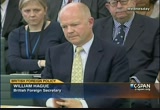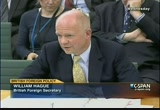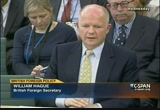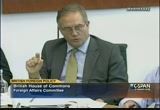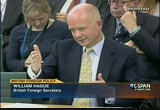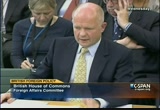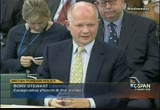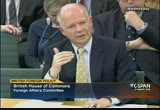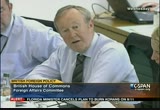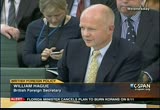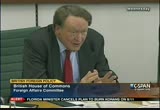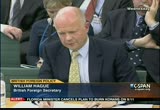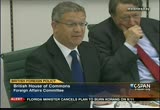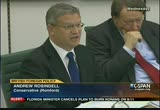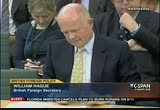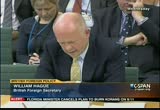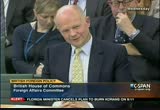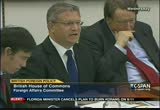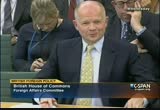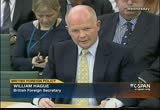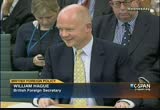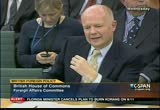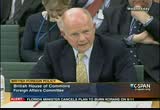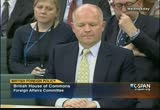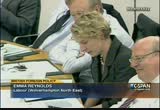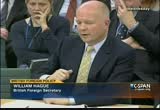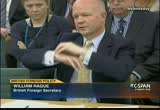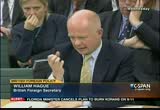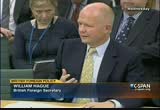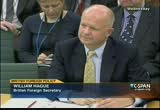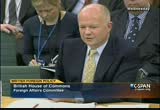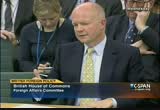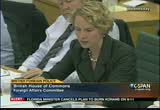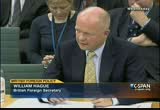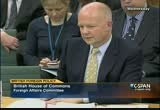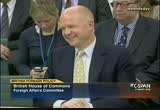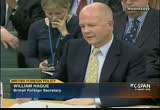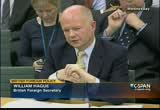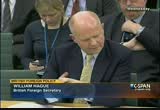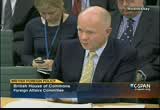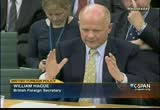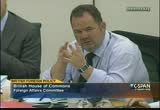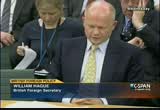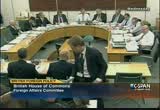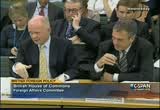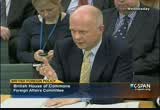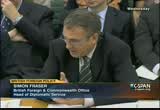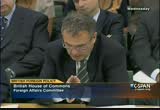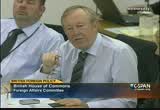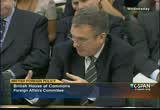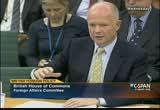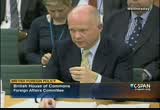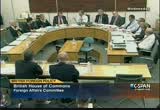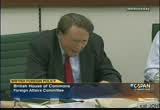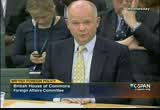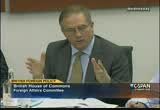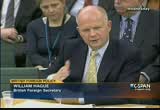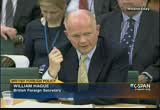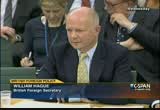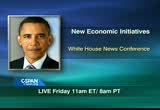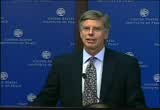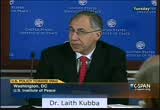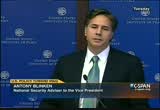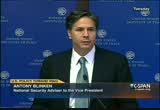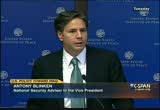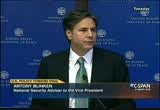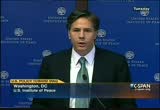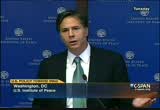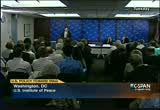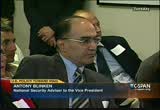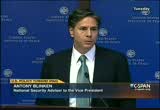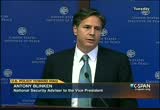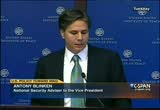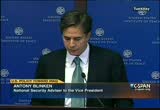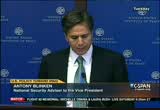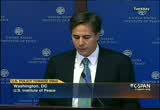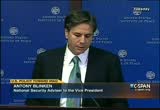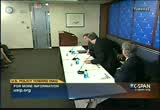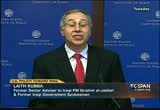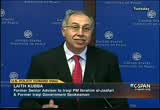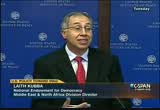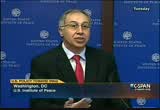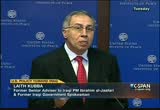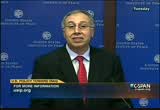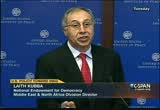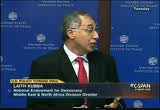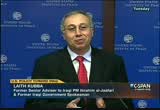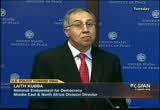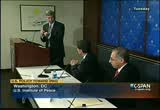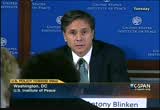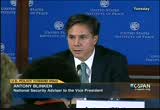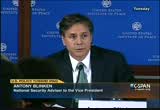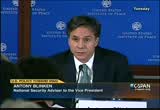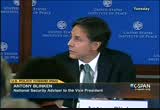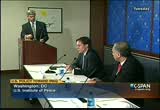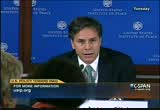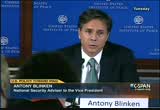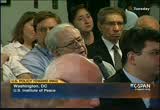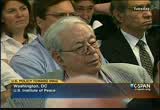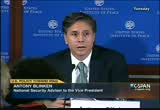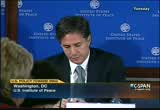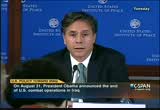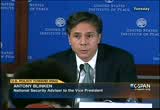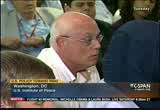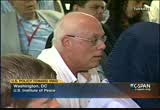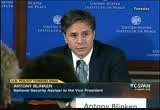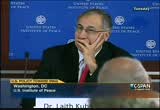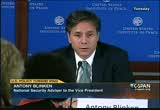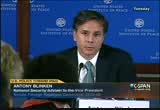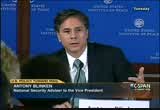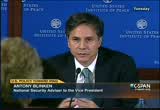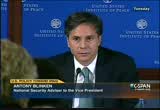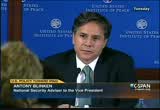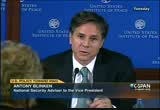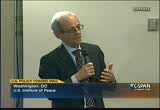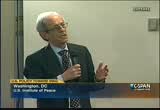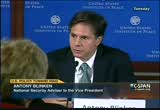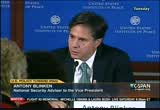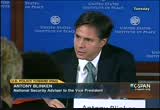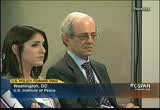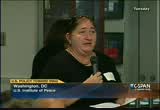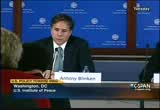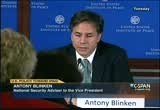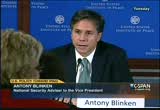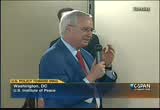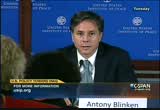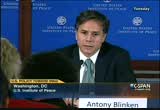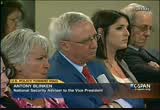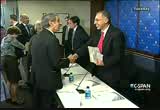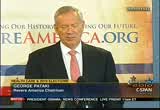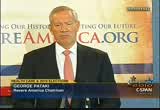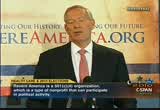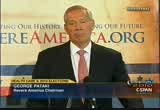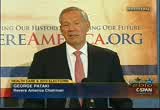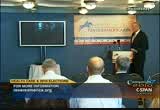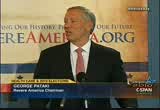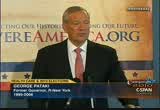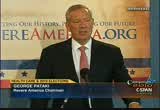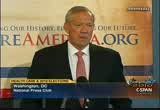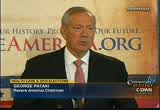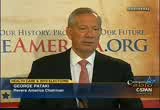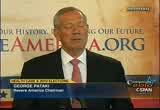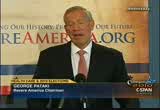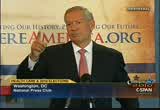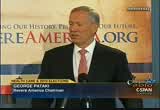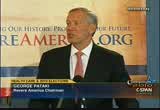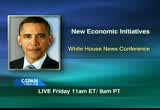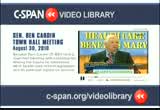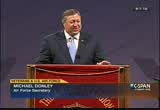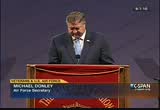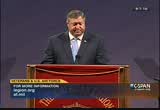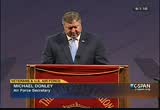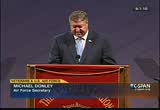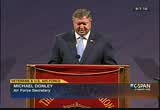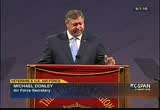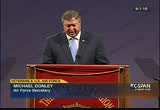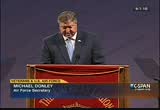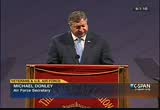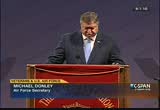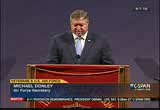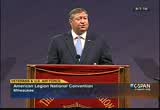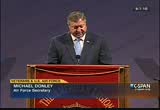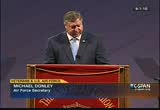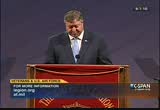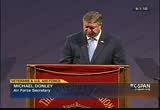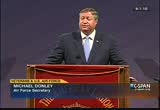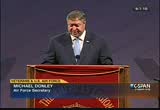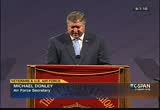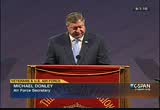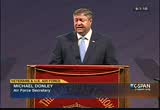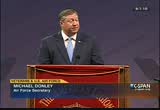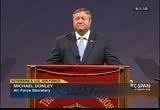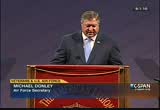tv U.S. House of Representatives CSPAN September 9, 2010 5:00pm-8:00pm EDT
5:00 pm
are entitled to expect that the allies we have been working alongside, who are the closest partners with our forces, they will be able to take on that burden themselves by that time. >> i would suggest the victory at the taliban -- we have had problems in the past about troop density in helmand. we have had equipment issues such as lack of helicopters. if you are born to fight a successful counterinsurgency campaign, you need certain
5:01 pm
preconditions in place. indeed to have a sympathetic population standing behind you. you need a good ratio of trips to the local population. i would suggest to you, we don't have those in afghanistan. what makes you think we are going to win this counterinsurgency campaign? >> i don't think anyone would argue there is a purely military solution to the problem in afghanistan. in this sense of winning the second world war, at some point the military method produces a country where they afghan residents in the vast majority of that country, or is superseded by a partial or
5:02 pm
substantial political settlement. what makes us think that we can make some progress now? that is really only very recently that all the necessary elements of the campaign have come together. despite the fact that there have been western forces there since 2001, it is only rarely now that the necessary number of forces are deployed in afghanistan, as general petraeus has recently been making clear. one of our announcements had been a 40% increase in the development going to afghanistan. we have an economic protests that that is bought out by the afghans themselves. all these things have come together in recent times.
5:03 pm
the single most difficult problem we have faced in international affairs, but i think now we have the finest military minds, a good military plan, the necessary quantities of development and the experience of provincial reconstruction, and motivated key ministers in afghanistan, to have the best chance for success that it is possible to put together. i believe is right to maintain an effort to succeed, because i think the consequences of abandoning that effort now would be extremely serious for afghanistan, for pakistan, and ultimately for our own national security. >> i agree with what you say,
5:04 pm
there cannot just be a military solution. i doubt whether we are winning the hearts and minds of the campaign either. the u.s. department of defense says the most lethal weapon the taliban has is the propaganda machine. economically it pays to sign up for the taliban. even our more money in the taliban than the average salary begin can earn more money in the taliban. increasing numbers of afghans are being becoming disillusioned with the direction that afghanistan is taking. i would ask the secretary, what
5:05 pm
is your assessment of the situation there? it does not feel that we are waiting on the ground. >> i think is very hard to generalize. there are surveys in a country like afghanistan. the have shown that the majority of people do not want forces to leave afghanistan. that can lead to contradictory conclusions. in my own experience of meeting people in afghanistan, in some of the most difficult areas in parts of hellman, walking around and meeting people a couple of months ago, in those areas that have been made more secure and more people can see health care
5:06 pm
being improved, then the hearts and minds of local people are certainly behind us. we are coming up to parliamentary elections in afghanistan on the 18th of september. i don't want to raise the hopes or expectations, given what has happened in previous elections, but will undoubtedly see increased numbers of people what to take part in the future of the country, which they would not be able to do in a taliban country. i think it would be wrong to leap to the conclusion that the local population wants us there. do we still have many problems, too many people working for the taliban? of course we do. but i think what a bit of progress has been made. >> we have been talking about a
5:07 pm
political strategy in afghanistan. sometimes the afghan government doesn't seem to be fully behind it. sometimes the government of the united states does this seem to be fully interested in it. what does the political strategy look like? what do you talk to them about, and what do you offer them? >> this has been afghan-led protests. -- process. i don't think it would be right to sit here in london and laid down here are the people we have to talk to in here is the deal to talk about with them. i don't think it is possible for us to do that, and even if we
5:08 pm
could, it would be impossible to announce it in public to any form. it would have to be an afghan- led political reconciliation process. that is something the prime minister and other ministers and i have discussed several times. the president has ministers around him who are committed to it. they have gone to great lengths to make sure they have the authority to do that. that have to be in the driving seat in that process. >> do i take it that the position you have outlined is the position the coalition government -- what is the position irrespective of the position of the united states
5:09 pm
government? >> sovereign rights have set out our position and we will maintain it. >> what is the benefit of the 2015 figure? what advantage do you see of 2015, because it seems to some people it says to the taliban if they stay in until 2015, that will be able to go back to normal business? >> it is important to have a sense of perspective about it. it is further away than the initial deployment of our troops andin helmand.
5:10 pm
the benefit is that we must be cleared, the leaders of the people of afghanistan, it is absolutely crucial for their future that they look after their own affairs and security. it is not possible for the united kingdom and other countries to take on ourselves the burden of their security indefinitely. it is possible for them to manage their own security without presenting a danger to the rest of the world. we have every right to expect it to be in that sphere. i think it does intensify the pressure about the afghan national security forces to be met by 2014. we don't want anyone to think
5:11 pm
that -- >> i am sure you'll agree that to achieve success in afghanistan, we have to provide a reasonable degree of security in that country. i am sure you would agree that the fundamental aspect of that is effective cross border security cooperation between afghanistan and pakistan. do you agree that that is critically important, and it still has a long way to go? do you see any prospects for achieving this sort of alternately entrenched, successful cross border cooperation backup we achieved
5:12 pm
-- use the chance of achieving that cooperation between afghanistan and pakistan? >> there is a good chance of that improving. it is a very difficult war to police. geographically, it could not have been designed to be more difficult. it is much more difficult than the border between northern ireland and the republic of northern ireland. and don't want to exaggerate anything or raising expectations. the cooperation between the government and military of afghanistan and pakistan has improved in recent times. that is the feedback we have had from both sides of the border. i have heard that from the head of the pakistan the armed forces. so there is an improvement taking place in those relations that.
5:13 pm
>> i want to ask about the overseas territories. you will be aware that the united kingdom has over 16 territory spanning the globe. 16 territories for whom we have responsibility, the people of which have shown tremendous loyalty to the crown over many, many years. i believe in recent years that felt disappointed and let down
5:14 pm
but the neglect of the government here in london. three points i would like to make. to tell us what the new government's position will be regard to the british overseas territories? will there be in your and more positive approach that will bring the territories closer to britain and make them feel british, because at the moment, many of them wonder why they remain under britain. if there are british overseas territories, why are they under the foreign office, a day or british? is there an assurance that there will never again be and return to the colonial attitude of the government of mr. blair and 2002 which sought to impose a joint sovereignty deal of the people of gibraltar without even consulting the people of that
5:15 pm
territory, even though the previously voted 99% against being and next by spain. >> i also feel strongly about this. i think there should be a clear strategy in this country for the overseas territories. i think we should be able to assist them in their economic development, and you can see the evidence of a change in approach. the department of international development -- nothing we have a response ability to insecure -- insure the security as well as support their economic well- being. it can create substantial challenges for the united kingdom. the previous committee has looked in detail at some of
5:16 pm
those challenges. we need to manage those risks quite carefully. there have been fiscal crises in some of the caribbean territories, very severe problems in the turks and caicos islands. the department of international development has made a loan to help them through the last few months, and the governor there is working very hard on both problems. i have commissioned a review of our overall approach to the overseas territories. that review is not yet complete, but we will look forward to discussing it with the committee. i have put in charge of minister of great enthusiasm. i have great enthusiasm about putting some real purpose it in
5:17 pm
our policies toward the overseas territories. that is the overall position. why are they in the commonwealth office? i think it might be a diversion of your ever to put them in the home office. we are clearly doing our best not in the foreign office. they are not the same as friends. -- not the same as france. i think the foreign office is the appropriate home, but we will try to show over the coming years that we deserve that role. i am sure you have heard me say in the past, there'll be no change in the position of gibraltar without the get -- without the consent of the people of gibraltar.
5:18 pm
>> maybe you would like to look at why they are treated differently, because that would help to assess why the overseas territories remain under the foreign office. if i could ask two specific questions on two specific territories. can i say, foreign secretary, that there is a near state of emergency in the eyes of the public in the turks and caicos islands. will the british government look at the situation there which is on the brink, and take urgent command i hope, immediate action to support the governor? in to work with the people there? to deal with the illegal immigration? and to bring back democracy as fast as is practicable? secondly, could you please --
5:19 pm
referring to human rights cannot tell a shoreview about the human rights of the people on the particular islands who were rejected in the 1960's from their homeland. would it not be a significant gesture if the government were to reverse the decision of those then-labor government and allow them to return in a limited way to their homeland? >> two huge issues. in the case of the turk and caicos islands, a lot of work is going on. about 3 million pounds was committed over two years to support the governor, to implement recommendations of the commission of inquiry. there are advisers in place. we will keep it under review, as to whether we need to add to those. when the ministerial government was suspended quite rightly by
5:20 pm
the last government, the u.k. said it would be for two years. it could be shortened or lengthened. that has been kept under review. you mentioned at democracy. it is important to allow the turks and caicos islands to express views. we have an advisor there. he published a report for further comment. his conducting further public meetings of the islands, all broadcast live on tv and radio. she will meet the advisory council later in the month. we're doing what we can to ensure genuine consultation with the people of those islands. will it be necessary to give additional assistance? it well may be. there has already been a loan of 10 million pounds relief in three trenches, june, july, and
5:21 pm
august. they now face another shortfall by the end of september. we will have to decide how to deal with that. and to add to the point made about the timetable -- if we do have the flexibility to hold elections later -- if necessary. this committee and the last, if you got the report, expressed concerns about necessary reforms by july 2011. former ministers could be reelected and resume allegedly corrupt activities. we will be on our guard for that. and ready to change the timetable if necessary. $$$$$$$$$$$$$$$$
5:22 pm
i'm looking at this in great detail. it is one of those long$$$$ standing, frustrating issues. i feel it is necessary -- if i'm going to be confident of our policy on the british indian ocean territory, that i have looked into it personally, in detail. i was holding a meeting in the foreign office earlier this week about this. i have to say that when you do go into it in detail, it is quite hard to hold out the prospect of a fundamental change of policy. i do not want to raise any hopes of that. and on the question of human rights, there is a case at the moment.
5:23 pm
it is important to recognize we have a treaty with the united states. it was entered into by the previous government, the labor government, but nevertheless. that lasts for 50 years, renewable for 20 years. the altar islands, the archipelago, is what is under discussion, as to whether people could return to those -- there was a feasibility study in 2002 that set not really. there's very little land there. it is more than 1 meter above sued. -- of sealand. making settlements viable of such a place, given the hostile pressures of climate change and
5:24 pm
sea level is a very daunting prospect. that is a sobering realization, however much it is nice to have almost a romanticized idea that it would be possible for islanders to return. in practical terms, it is a really difficult proposition. we continue to examine it in detail as the responsible minister henry bellingham. onll maintain our position the proceedings. >> to go. we are this year doing something -- thank you. tore waiting for the review come out.
5:25 pm
we want to get some questions in early. [unintelligible] >> over the last few months you have made several promising speeches. in when you said although the world has become more collateral, it has become more -- you said you were determined to -- how do you assess the risks of strong but uncoordinated bilateral relationships between member states and countries outside the european union? in a multi-pole world, are you in danger of underestimating our role in the european union could have?
5:26 pm
>> i hope not. we have made it very clear we want to see the it eu which collective weight in the world. a lot of my time has been spent doing that. one of the most important things we have done in that you in the past few months have been the sanctions package -- in the eu, has been a package concerning iran that when beyond the un resolution for 1999. i think it has made quite an impact and been a surprise to the iranian leadership, and has delighted our allies. europe was able to agree on a strong, meaningful package. i put a lot of effort into that. another example would be the
5:27 pm
western balkans. i spent a lot of diplomatic time on those issues where we are trying to ensure that serbia and kosovo are able to speak together. i have tried with colleagues in france and germany to make sure there is an agreed eu approach to the whole. i don't you do think that we're not playing our role in that year. but that cannot be the entirety of our requirements around the
5:28 pm
web. the european union does not agree on every subject of foreign policy. european nations all have their own commercial and economic priorities. it is important for britain to retain our own capabilities. it may be that the european union can work together collectively on strengthening our relationships with china, india, brazil, and so on. it is vital that britain is able to make those bilateral links. we are in the networked world, as i argued in a speech in july. you must have good relations with countries that are not in any particular block. they are not just government to
5:29 pm
government relations. they deal with culture, education, etc. on top of participating fully in multilateral organizations, playing a big role in the g-20 and so on, it is also crucial for britain to be intensifying our links with the fastest growing economies of the world. if we do not, others will. france and germany will not shrink from it. it means that our multilateral and bilateral biases are not in conflict, but relying solely, or thinking the world is simply progressing into a more multilateral structure, i think would be a mistake.
5:30 pm
no one is going to protect us if we do not protect ourselves. no one will secure our prosperity for us unless we actually go out and secure the jobs and businesses and contractd for british firms -- and contracts for british firms. it is crucial. >> maybe i could ask about competing bilateral relations, especially in areas of the world that are particularly sensitive. the prime minister recently stated in india that pakistan was facing terrorism and slave labor. also, problems in turkey. in some areas he was greeted with applause by saying it was frank and open. my view is that diplomacy --
5:31 pm
the main thing is the consequences and the objectives you are pursuing. which were the positive objectives he was pursuing, or were they simply remarks? what is the risk about pronouncing about another country when you are in a neighboring country that is quite sensitive? >> it is hard to be very rigid that if you go run the world you never say anything about other countries in the world. our view on gaza --it is vital to open it up more to allow goods in and out. it is well-known. the prime minister was stating -- on india and pakistan we have so clearly set out the
5:32 pm
ambition of an enhanced relationship with india in the speech -- and what necessarily goes along with that is a strategic partnership with pakistan. those two things go naturally together. otherwise, we make up position with pakistan more difficult. -- we make the position more difficult. i think that pakistan understands that well. it is true that a couple of people did not react well to what the prime minister said. but it is also true -- the prime minister met with the other leader and had a discussion. after the immense u.k. contribution to the disastrous floods we have seen in a pakistan, but cooperation between governments is very strong.
5:33 pm
the appreciation in the pakistan for britain's friendship and commitment is also very strong. that is how it must be. >> but it didn't his comments make that relationship, and that meeting -- did in his previous comments make that more difficult? did the prime minister seek your advice before using those words? my interpretation is one of the effects that he may have weakened the president's position in his own country. >> not at all. i would not interpret it that way at all. [unintelligible] the prime minister was making
5:34 pm
the point that there is more work to be done on tackling terrorism, including in pakistan. that is absolutely true. there has been no ongoing interruption of the cooperation we have with the pakistani intelligence services. there were one or two dramatic headlines at the time. >> but a delegation was supposed to come to the uk? >> it has been to the u.k. we must emphasize to the people of pakistan that we are interested in pakistan, not just because they are a threat to our national security, but also that we need that long term
5:35 pm
relationship. that we regard the role that more than 1 million british- pakistanis play as a positive thing. we're there for the long term to work with them. that is why we have substantially increase the development budget for pakistan. we have that really led the way on the reaction to the floods. last week hillary clinton said on the telephone to me that she recognized british leadership, and response to the floods there was second only to that of the u.s. it is very important that that is followed up. i went to pakistan for three days at the end of june, and spent a lot of time doing television programs and radio interviews to try to committed to the people with commitment of a briton, not just to their ministers.
5:36 pm
>> wouldn't it have been more effective for the prime minister to speak about the pakistan security services, rather than in india? [unintelligible] >> well, he will be going to these places too. so stand by. as i say, i think -- i think it is wrong to be critical talking about international affairs in general. inevitably, in interviews you do that. what the prime minister said on those occasions was absolutely right. to put both these things you raise in perspective, i have
5:37 pm
mentioned how closely we are working with pakistan on the floods and in so many other ways, but also with israel in recent weeks, the run-up to the talks last week between israel and the palestinians, our prime minister has played role in that. an important role. talking to mr. netanyahu, urging president abbas to enter the talks. and we are able to have those discussions with israel, notwithstanding anything we may have said about gaza. i think countries understand we will not always agree on every topic. sometimes we say things about the united kingdom, sometimes about them. in the case of israel and pakistan -- there are tensions in both relationships even while we are hoping. we have close cooperation with accounts. -- we are helping also.
5:38 pm
>> [unintelligible] what has been achieved so far? >> a good deal. first of all, we have clarified our position on pakistan. we have made sure that ministers worked easily together for we have troops deployed to such an extent in afghanistan. on that and on many other projects, departments of state are working together more successfully with and at times in the past. the purpose of the national security council does not to strengthen each department, but to make existing ones work well together. on the issue of the pakistani floods, this has been a terrific job. at the same time, the deputy prime minister has been there.
5:39 pm
he has seen for himself on the ground -- i have been playing my role asking other european countries to contribute more. it is a cohesive effort on all issues. the national security council make that much easier to achieve. i will mention a couple of other attributes. it means we have a common sense of our ambitions in the world. i have been talking about intensifying relations of emerging powers and economies. having the national security council hopes to make sure we have the same sense of what we are achieving together, that foreign policy runs through the veins of the other departments of state. it is something for low whole of government. the nsc really helps to achieve that.
5:40 pm
it means that the advice coming to the prime minister about four affairs issues comes through the national security adviser. in it comes to the foreign secretary and defense secretary as well. we're all thinking about these things together. one of the most important pieces of work we are undertaking is the review under way at the moment. we have all the major heads of agencies and and staff able and used to working together and making these important decisions together. it provides a framework for all these things, and so far has been a success. >> is there not a dilution of responsibility? >> no, not at all.
5:41 pm
we have a prime minister who strongly believes, thankfully, that the foreign office should have its proper role in government. and it does mean the foreign office has to step up to the mark. it means the ideas and expertise have to flow from the foreign office into the national security council. but i am confident that is what is beginning to happen. and if anything there has been an entirely proper move the other way. we have not just the nsc, but the european affairs committee, which i chair. we have a joint secretary from
5:42 pm
both offices servicing that committee. the foreign office is institutionally much more back in its proper place in government as a result of changes made so far. >> due to those meetings and advantages you just explain, what disadvantages have you come across? >> so far there are none. it is a lot of meetings, but they could not be more important meetings. i will give you another advantage. concern with development, energy, home security, foreign
5:43 pm
affairs, defense -- we actually think together about the huge challenges we face. one of our meetings about afghanistan lasted almost the entire day. we can explore the options and have people from outside to talk to us -- it means we're not just taking off boxes on the paper. we're spending the time thinking together about national relations more broadly -- we're not just ticking off boxes on paper. so far it has worked well. that is the honest truth of that. >> it has been reported that peter crickets would not be at the nsc for long. could you comment? >> neck, he was there this morning. -- no. any , it will have to come
5:44 pm
later. we're very grateful to him for taking it on with no notice on the first day the government took office. i don't think it would be right for me to go into more detail on that now. >> ok, we will move on to trade and commercial issues. you expect to have less resources and staff available? can you say a few words about the pronouncement and focus on commerce, and what particularly you have stopped doing? and you do something different. can you tell me whether you think your diplomats will have the skills required to do that change? concerning another's commons,
5:45 pm
what changes we have in your recruitment policy that will give to make sure you got people who have the skills and background to be of some assistance to business? >> you can see our commitment to have the necessary skills since our new secretary came from the business department. perhaps he can expand on the skills. in many ways this requires some additional energy. it is not much that people are taken off other things. but we will have to set priorities as we go along. it is building into everything we do. when i leave your committee, whenever we have finished, the
5:46 pm
foreign minister of vietnam will come into the foreign office, and a lot of our meeting will be about trade issues. my decision is that an increased proportion of all the time i spend with my counterparts around the world is about trade and commercial issues. i will bring a five or six different areas in which we can do more business in vietnam. so, it is really that sense of building into everything that we do. wherever the prime minister or i, the chancellor, or secretary go, we should have a clear sense of what is at stake in that country for british business. that then should run through the work of the whole of the foreign office as well as other departments. the prime minister appointed steven green, someone i think will be an excellent trade minister, well-respected and the business world, and globally. it is being done in that spirit. it is in regard for organizational changes.
5:47 pm
perhaps someone can talk about that. -- simon can talk about that. >> it is not that we have not done it in the past, but it is appropriate for the current moment given the world situation. but there should be a particular focus of what we do in a foreign office. what we can do to support economic recovery in this country and more generally. it is not as a solar that would be doing -- we would be doing that instead of other things. but it is the mindset, and how we approach bilateral and multilateral relationships, and prioritize issues. looking across the organization -- we have the welcome of women of a new trade minister -- we have a u.k. trade and investment. it is an organization that is
5:48 pm
jointly printed by the foreign office and business department. i think it is an effective organization. i don't think we should seek to duplicate or place ukgi, but i think it is not thinking about a new strategy for promoting trade and investment. within the foreign office we have set up a task force to look at and make sure that across the organization people are taking those opportunities in thinking economics and commercial opportunity and with a foreign secretary has described. we are about to launch a new business planning process which will be the basis for our activity and resource allocation once we know the outcome of the spinning round. within a process, one of the big themes will be promoting british prosperity through
5:49 pm
economic and commercial activity. in all those ways i think that we can achieve a greater focus and clear understanding of where the priorities lie and they all diplomatic activity both in london and around the world. >> i'm well aware that diplomats act as both diplomats and promoters of trade, but if those believe that you said such a high priority on trade, then isn't it likely that, for example, if they were speaking to their counterparts in china, that they would be less likely to raise issues of human rights then there would have been previously? then if they believe your department has its highest priority in the tree? how we make sure that your diplomats understand this still have two rules? -- two roles?
5:50 pm
>> all our countries have set priorities. of course, in the case of china, it will be purdy's relating to fiscal development and applying appropriate pressure to human-rights as to climate objectives and other. we have to have confidence in representatives. i hope that we can avoid a disproportionate shift the focus such as you are describing. >> [unintelligible] i think they did a good job on
5:51 pm
handling relations with china, and billing of the at the mine dialogue with them. and adding to it the strategic dialogue with china in closing weeks. i went to beijing in the middle of july. we are the only country other than the u.s. with that level of formalized dialogue with china. it is fundamentally in our interest to encourage a good trade relationship with china. it is not to say we will not raise human rights anymore. i think they understand that. china will continue to raise human rights concerns. >> could you answer to something about the recruitment side? does that change mean the will be a difference?
5:52 pm
are you looking for different qualities, skills then you did in the past? >> more expensive business with certain benefits. -- more experience in business. also, turning people in different ways -- we can use private-sector expertise to embed the strong sense of commercial diplomacy. >> in general, we have as a principal of recruiting people who have a broad range of abilities and potential. then we train them through their careers. the turning we offer in the foreign office should be tailored to the priorities. the foreign secretary mentioned the new programs in place with focus on economic and commercial abilities.
5:53 pm
we have recently been pursuing a policy -- to business, people going to important heads of mission posts and countries for the economic commission is facing significant -- for example, the ambassador in china concerning rolls royce. there are number of ways to address it. >> my question leads on from those of dave watts. the british foreign office has undoubtedly a great many very major achievements to its credit, but being brutally frank, it has some very serious moments of failure. moments of failure when it has failed to recognize and grapple
5:54 pm
with the security realities. the british foreign office was the arch-opponent of appeasement in the second world war. in the memory of many of us, the british foreign office in the run-up to the falkland war could not have given a more clear indication to the argentinan military junta that when -- the falkland islands. -- that it wanted something to do with the falkland islands. against that background, and the messianic approach to business interests, it can you assure this committee that the ultimate responsibility and priority of the british foreign office during his coalition government will be the security of the british people, the security of the countries with whom we are in the military alliance, and the security of our overseas territories?
5:55 pm
>> yes. in the priorities we have promulgated in the foreign office with pursuing an active policy, strengthening rules, and dealing with our values, the three key parties we have listed are safeguarding national security and the different ways. working to reduce conflict and being vigilant. as you say, that has not always been the case. the second is to build britain's prosperity by increasing exports and investments. the focus is to support british nationals around the world through more efficient consular services. both it is a vast subject in itself. at any one time there are two million british people overseas, and many of them turn
5:56 pm
for help to the foreign offices. >> a final question. >> increasingly our international terms of been connected through more informal, ad hoc weighs in contrast to what we have been used to. to what extent as the foreign office adapting to that? how influential beating britain will be in trying to reform an address that issue on the global scale? >> you can gather from what i have been saying about the network world, that works of bilateral relationships that the central thrust of our approach is on this point of making sure we have patents of
5:57 pm
influence rather than taking one or another organization is the key to influence in world events. i think that we have the strategy right. the foreign office has the adaptability. it has the language skills, knowledge. these things may need more accentuating in the future to give us the flexibility and knowledge of different parts of the world, to be able to cope with that shifting pattern of world economic and political influence. we may have to be adaptable in the way we deploy people, and in the way we spend our ministerial, diplomatic effort.
5:58 pm
there is an intensified effort to be in the far east, south america quite a long time, since the british foreign secretary did a full-scale visit to south america. i am intending to do that in the spring. the secretary has been to australia for 20 years. we will have to adapt the. i think we are prepared to do so. >> in a brief return to afghanistan? to what extent do you foresee what ever final solution involves negotiations with the taliban? -- can i briefly turn to afghanistan? >> that goes to reconciliation. i have stressed the must be
5:59 pm
afghan-led. here we get into the question of what the taliban is, because it is not a single organization. there are many different factions, many different shifting alliances. it is for that process to determine and discover which of those are people based on what on what president karzai and others set out to forswear violence -- which of those are willing to be part of the reconciliation process? it depends on that and on them on whether they are willing to be reconciled on such a basis.
6:00 pm
>> thank you very much indeed. you have gotten our relationship off to a flying start. i look forward to seeing you briefly as we can arrange it. [captioning performed by national captioning institute] [captions copyright national cable satellite corp. 2010] >> join us on friday when president obama holds a news conference from the white house. we expect questions on the economy, iran and iraq, the situation in afghanistan, and other issues. that is scheduled for 11:00 a.m. eastern, and you can see it live here on c-span. saturday marks the ninth anniversary of the 9/11 attacks. this weekend, pilots, air traffic controllers, and other aviation officials are gathering
6:01 pm
at the university of texas at dallas to discuss their experiences from that date. we will hear from the faa official who called for the grounding of all flights and the military pilot who flew under orders to stop all aircraft. we will bring that to you live saturday at 2:00 p.m. eastern here on c-span. >> this weekend on "book tv" commemorating september 11. the pulitzer prize winner for "the looming tower" on the events that led up to 9/11, and the detailed discussion about the collapse, the clip at an excavation, and the manpower it took to achieve it. and huffington says america is losing its position as a political leader and put the blame on corporation. for all of this week in's programs and airtimes, go to booktv.org.
6:02 pm
>> august 31 marked the end of u.s. combat operations in iraq. next, a discussion of the future of u.s. policy toward that country. the u.s. institute of his hosts this event with remarks of the national security advisor to vice president biden. this is an hour and 10 minutes. >> ladies and gentlemen, let me welcome you to the united states institute of peace. we're very pleased to be able to open our academic year with a talk about the events and previous work and looking forward events in iraq. this is an important time. it has been a long time that these events have been going on, and i'm sure we will have enough to go into some depth on this.
6:03 pm
we have the national security advisor to the vice-president. they have spent a lot of time in baghdad and around iraq. most recently just last week, but they have been there six times in the past short month, and will have a lot to say about this. he will be followed by the now- director of eastern north africa at the national endowment for democracy and long-time for this event and observer of iraqi politics, so we look forward to dr. kubba's comments as well. following that, we will have time for you to ask questions, and we look forward to that part of the discussion as well. >> thank you very much, and good afternoon. it is great to be here, great to be with all of you.
6:04 pm
bill, i just wanted to start by commending your own service in iraq, afghanistan, ukraine, pretty much any hotspot you can think of, you were there and perform a tremendous service to the united states. i wanted to thank you. i also want to single out a couple people of course. richard solomon, always great to be with him. and a dear friend and colleague, tara sonenshine. it is a great pleasure to be here. the mission of this institute is more important and more significant than ever. to have a non-partisan group of deeply informed specialists working on the most critical issues of the day in terms of peace building, because -- post- conflict reconstruction and development, it is simply more vital than ever.
6:05 pm
the administration deeply appreciates the work that you do. when i worked on the hill, another congress appreciated it very much as well, and we look to you to carry a very heavy load on these very difficult issues. president obama ran on a commitment to end the war in iraq responsibly. last week marked a very important milestone toward that goal. our combat mission in iraq is over. the iraqis now have lead responsibility for their own security. we have remove roughly 100,000 troops from iraq since we took office. from nearly 150,000 when we came in to about 50,000 today. we will make good on our commitment to remove all of our troops from iraq by the end of 2011. until then, our remaining troops will advise and assist the iraqis, take part in counter- terrorism operations, and
6:06 pm
protect themselves, our civilians, and critical infrastructure. just as significantly, we are not disengaging from iraq. the nature of our engagement is changing from a military leave to a predominantly civilian one. put another way, even as we draw down our forces, we are ramping up our civilian engagement. political, economic, diplomatic, to deepen iraq's sovereignty, self-reliance, stability, and to build an ongoing partnership between the united states and iraq. i thought i would talk about these civilian efforts today, but it is important to set the context that this change in mission is taking place in. if you step back and look at the big picture in iraq over the past 18 months or so, i think it is this.
6:07 pm
violent incidents are significantly down. the capacity of the iraqi security forces is significantly up, and politics has emerged as the basic currency for doing business in iraq. if you are just reading about iraq in the daily newspaper or watching television at night, you might come away with the impression that not much has changed there, that iraq continues to be more of the same -- suicide bombings and attacks. to be sure, extremist groups continue horrific acts that take innocent iraqi lives. iraq remains a dangerous place, our civilians, diplomats, troops remain in danger. but the facts are these -- the number of weekly or monthly security incidents in iraq is at its lowest level since 2003. there has been a dramatic decline from the dark days of 2006-2007, and the level has stayed down consistently. two quick examples -- the week
6:08 pm
that ended september 3, last week, total nationwide attacks in iraq decrease from 186 to 102 from the previous week, below the 12-month average of 111. let me put that in perspective -- during the darkest age of the insurgency in 2007, there were 1800 the tax in one week in june. for about two years -- 2006 and 2007 -- the average number of weekly attacks was about 1100. if you are a victim of one of the 100 attacks that took place, that might not be much solace, but there is a clear trend, a clear picture, but that has been sustained. what does that mean for the iraqi people? it means that the quiet blessings of a normal life are increasingly within reach. in baghdad, people are going out to shops, restaurants, markets are bustling, homes are being built. there are traffic jams, and not all of them caused our security
6:09 pm
checkpoints. if you talk to reporters who are based in iraq, they will tell you that for all of the remaining problems, they have more freedom of movement and access now than they have had at any time in recent memory. maybe most important, while the attacks do continue, they have not achieved their strategic objective, which is to realize the sectarian fuse or fundamentally undermine confidence in the government. in fact, when you talk to iraqi leaders from across the political spectrum, they characterized the remaining attacks not as an insurgency but as acts of terror by a relatively small group of extremists on different sides who are not getting traction with the iraqi people. the progress we have seen is due in substantial measure to the extraordinary skill and professionalism of the u.s. military forces who have been and remain in iraq, and we had an opportunity to talk about
6:10 pm
that in iraq last week when the vice-president was there. secretary gates, admiral mullen, general madison, and others, for the change of commission and the change of command. some of you may have seen on television. but the progress is also due in no small measure to the increasing capacity of iraqi security forces. we have trained about 650,000 iraqis, including very effective special operations forces, and there is evidence of this increase capacity and professionalism. the iraqis took the lead in securing the recent elections and did a very good job. in recent months, iraqi-led operation is based on iraqi- developed intelligence have helped kill our captured 32 of the top 42 al qaeda leaders, and they are taking on shia to extremist groups as well. maybe most important -- the iraqi people have decisively rejected violence and their leaders embraced the political process as the best way to
6:11 pm
secure the interests of iraq's communities. that process is very rarely pretty and almost never linear, but the evidence is that it is working. we have been through a series of sky-is-falling moments in iraq. consider the events with the election law and the controversy that erupted around that. debathification efforts before that. right -- every time, people said, but " this is it. this is the end. the sky is falling." each time, they used their means to work for the political process. the sky has not fallen. of course, it is also true that the sun has not yet risen on a new government in iraq, and the length of time it has taken to get that government in some ways is not unexpected. last time, i 2005-2006, it took about six months, which is roughly where we are now in the
6:12 pm
process. this time, the election itself was extraordinarily close, as i think most of you know. two seats out of 125 separated the leading coalitions, and neither is anywhere close to getting a majority needed to form a government on its own, so we have this process of coalitions working together to try to form a majority -- 163 seats -- in their parliament. this time, the stakes were even higher. as the iraqis know, we will remove our remaining troops by the end of 2011. they are determined to get government formation right, even if it takes a little longer. unlike last time, however, a dangerous power vacuum in iraq has yet to develop. a lack of government formation does not mean lack of a government. there is a caretaker government, and it is basically doing just that -- taking care of the basic business of providing security,
6:13 pm
providing services, expanding the budget. but of course, the absence of an elected government is not a durable solution. major challenges remain before the iraqis, including disputed internal boundaries and the status of kirkuk, laws that govern oil production and revenue sharing, the integration of kurdish and sunni military forces -- security forces. all of these would benefit and indeed probably require the legitimacy of an elected government to move towards resolution. similarly, we in the united states, want to build a long- term partnership with iraq that i will talk about in a moment, but to build a partnership, we need a partner. here, too, moving forward requires greater certainty and legitimacy of eight -- of an elected government. most encouragingly, the iraqi
6:14 pm
people voted in large numbers across all communities for new representatives and for a new government. they expect a new parliament. they expect a new government. they deserve them. let me talk a little bit about how we see things going forward. president obama has been focused on iraq from day one of this administration. in fact, even before day one, he spent -- he sent vice president elected by the to do a baseline assessment for incoming administration. one of the first things the president did before taking office was to order a full review of our iraq policy. he laid out a new plan going forward, and he asked the vice president to oversee iraq policy because he was determined that we would have a sustained, high level focus from the white house on iraq every day. the vice president shares a monthly cabinet meeting on iraq. he is in contact every week and
6:15 pm
sometimes every day with iraq's leaders, with our very strong team in baghdad. as i said at the outset, we are not disengaging from iraq. concrete evidence of that commitment is our decision, which the vice president announced last week in baghdad to open conflict offices. we want to ensure that our engagement continues to cover the breadth and depth of iraq. the state department is going to bear the heaviest burden. dozens of tasks that were previously the responsibility of our military have now reverted to the department of state, including a major, nationwide police program starting in october of next year. the president and vice president
6:16 pm
determined that a state takes this responsibility. we have a whole government approach, especially when it comes to our commitment to build up strategic framework agreements with iraq and bring it to fruition. that agreement commits us to strengthen ties of commerce, trade and investment, culture and education, diplomacy, and security. we have already held a major investment conference in washington that brought about 1100 u.s. and iraqi government officials and private sector representatives together. the commerce department is going to take a delegation to baghdad with a dozen companies looking at potential business deals and investment opportunities with their iraqi counterparts. this june, the department of agriculture brought leading agricultural firm store rack is 4 -- to iraq to export business opportunities. specialists from across the government, including treasury, justice, commerce, energy,
6:17 pm
interior, health and human services, usaid, are working closely with iraqi counterparts to develop iraq's capacity. the state department's largest full bar program in the middle east is in iraq. -- fulbright program is in the middle east in iraq. this summer, 25 iraqi professors, administrators, and beans from a number of universities across iraq are spending 10 weeks here at american universities, for dissipating in programs of education, public health, a linguistics, science and technology, and engineering -- participating in programs of education, public health, linguistics, science and technology, and engineering. we will also open an office of
6:18 pm
security cooperation as part of our embassy. this is something we do in embassies around the world where we have a significant security relationship. working from that office, civilian and military professionals and experts will continue to provide advice to the iraqi military and help them integrate american equipment. of course, our diplomats in our embassy will be on call to answer any requests for assistance in working through their internal challenges, developing stronger relations with their neighbors, strengthening their economy and provision of services, and working through iraq's continuing obligations to the united nations under chapter 7. let me conclude where i began -- president obama's commitment to end the war in iraq responsibly. the word "responsibly" is there for a reason. ours is not a rush to the exit. this is as much about what we leave behind as it is about leaving, and we are determined to leave behind a sovereign,
6:19 pm
self-reliant, stable iraq and a long-term partnership between the united states and iraq. there is a lot of hard road left to travel for the iraqis and so for us, but maybe, it is an occupational hazard. but i am hopeful about iraq's future and hopeful about the potential for a new relationship with the united states. thank you very much. [applause] >> thank you very much. i thank you for inviting me. that is a hard act to follow, following the statement that was given by tony. i think when it comes to the vision of the administration that was outlined on iraq, one can hardly disagree that putting more emphasis on the politics
6:20 pm
and not on the military presence is the right approach. i think the development that took place in iraq, without question, the u.s. military presence and serge had something to do with it, but more importantly, it is the shift in emphasis. iraq today has developed an army, and it can be sufficient, but the question is -- sufficient for what? i think on the first question, everybody agrees that the iraqi army today is not where it was of your or five years ago, and today, it can fulfill a lot of its duties in main iraqi cities. they do not need foreign troops or even an army of 250,000. what you do need is strong intelligence and professionalism, and i think this is where iraq needs the
6:21 pm
u.s. on that front, and specifically, the vision that was outlined is very much in line with iraqi needs. the reality is in respect of that vision and the intention, i think perception is important -- irrespective of that vision and the intention. i think the u.s. is getting perceived by the players inside iraq and outside iraq is as important as the policy itself. i think simply outlining the policy, it is about seeing it through, reaching for all its objectives. there is no question al qaeda will try to take some practical advantage out of the shift in policy, these attacks that took place in iraq will not pose any serious challenge to iraq, and i think they can be dismissed as being secondary. more of a concern among state
6:22 pm
iraqis themselves about the u.s. commitment inside iraq -- the u.s. is pulling out of iraq because it has been exhausted, because it has stretched thin, they follow up the news about the economy, and i think the impression is it is a choice that has been more or less forced on the u.s. by a reality, and the concern is very real amongst iraqi players about the extent of the commitment of the u.s. to seeing iraq through, and i think that is one area i would flag and raise as being critical. a second issue which is very much the elephant -- there are many elephants in the room that we need to talk about, but i think it needs to be spelled out, and that is, with the u.s. withdrawal currently among iraq's neighbors -- iran is currently the most influential with many ways to influence and
6:23 pm
to an extent, often dictate what is going on in iraq. i think the perception and reality of american withdrawal from iraq is going to be done carefully by iraq, and i cannot foresee the next four or five years without factoring iran into the equation. everybody knows that the u.s. is concerned about iran's programs, iran's regional position, and it is very much a subject of open debate and private debate, and i think you cannot detach debate on the future of iraq without directly addressing iran's influence and how this is going to materialize in the future. looking internally, the most important achievement the u.s. had after all these long years, and sacrifices that have been both from the u.s. and from the iraqi side -- iraq has a
6:24 pm
constitution and a political process, but it concerns me a great deal that this constitution has been weakened recently by politicians. not only -- initially, they started by delaying provincial elections by a year or two, and then, by looking at the outcome of the elections themselves, and now, it has been five or six months, and the constitution is not adhered to. a weakened constitution in a country that is full problems is not a good sign. there are a list of issues ahead, and the only point of reference other than violence they had is the constitution, and if the constitution has been marginalized or the iraqis have been allowed to marginalize it to that extent without serious pressure or determined -- or deterrent, it is weighing on the
6:25 pm
future of iraq. on the second point, the political process -- we have free elections in iraq, and the iraqis participated by 17% and took a lot of risks and sacrifices and were proud to have the first real democratic elections taking place in the region, but they are extremely disappointed by the outcome of the process. the novelty of democracy is wearing off. it does concern me a great deal that would iraqis have seen as the outcome of just elections is a high level of corruption and a dysfunctional government. time is running out. i think if there was a strong iraqi army today and that iraqi army staged a coup, it would be welcome by a lot of people because a lot of iraqis would like to see a functional government.
6:26 pm
that issue is real, not talk about often, but the ordinary people in the streets, there is that growing sentiment of frustration, of despair, of the process itself. another important factor is i think part of the u.s. strategy is to strengthen the iraqi army, and the iraqi army can be strong enough to hold security in iraq up to a point. it cannot fill in if the political process fails. in other words, if the issues between baghdad and the kurdish region are not resolved in a peaceful way, the iraqi army cannot resolve anything meaningful. i think there is the prospect of violence that can evolve if the
6:27 pm
political process fails. the other, if the political process for any reason excludes the iraqiya, the ones that for trieste's strategically and correctly, try to integrate them into the political process, but today, they are in a much stronger position. there is a balance of fear. old groups are armed, and everybody knows that violence is not an option, and everybody was seek that the political process ought to succeed, but the reality is if it does not, the level of violence that would erupt in iraq would require foreign intervention, and if that intervention does not come from the u.s., it might come from other sources. i think on the final point i make, the u.s. has brought a lot of hope to the iraqis, not only
6:28 pm
by getting rid of saddam hussein and setting up the political process, but also by advocating the essential values to deal with human rights, respect for the constitution, and on the day-to-day politics and under many pressures, i think that the u.s./iraq relationship goes under, maybe those issues become secondary because there are other more important, urgent issues that are forced on governments, but i think it is important strategically in all long-term that the u.s. fought to keep the pressure both politically and otherwise -- it has many leverage is over the iraqi government. that those achievements in the area of human rights, the rule of law, the freedom of the press is not challenged yet legally, but it might.
6:29 pm
but all these areas need to be maintained and need to be central in the vision and the approach that the u.s. government should take on iraq. i think as far as iraq's other neighbors, primarily turkey, and syria, want you i have always held and advocated is if the u.s. was to leave iraq, it ought to put some pac, some political pact that involves iraq's neighbors to avoid the vacuum and avoid a power grab that could take place on a much bigger scale. the power grab we saw in iraq after the fall of saddam hussein was messy, but it could be much worse if the u.s. was to leave iraq without a pact with iraq's neighbors on how to bring order to the region.
6:30 pm
thank you. [applause] >> excellent questions. tony, if you agree, i will give you an opportunity to say a couple of words in response or answer some of the questions. i thought he asked very good ones in terms of the extent of the u.s. commitment. the obvious question is if the iraqis, who are ambivalent about departure -- and we ought to be very clear -- it is not departure. it is military departure. military is going down. there have been conversations about what will happen if the iraqis asked for some delay. however, the question about iran is a good one. the beginning of the constitution and the possibility of frustration -- he even
6:31 pm
mentioned a coup. old groups that are rearmed. finally, a pact with the neighbors to maintain some stability there that was not there earlier. tony, if you would like to deal with any of those, and then, we will open up for questions. >> great, thanks. for the most part, i find myself in violent agreement on everything he said or ward about. the concerns expressed -- many of them are concerns we share and we are very vigilant about looking toward. most specifically, in terms of the ongoing commitment, i think there are two things going on. looking at polling, it is very clear that an overwhelming majority of iraqis want to see us remove our troops from iraq. 75% or 80% in most of the polls i have seen.
6:32 pm
one of the things that has really benefited our relationship with iraq is that we are making good on our commitments. i think many iraqis did not believe that we would get out of the cities a year ago, and we did. many iraqis did not believe we would end our combat mission and get down to 50,000 troops. we did. probably, there are iraqis who do not believe we will remove our troops pursuant to the end of an agreement with the government of iraq in 2011, and we will. making good on its promises is a way to build our relationship with iraq. we have also been emphasizing again and again that we are not disengaging from iraq. it is just that the nature of the age but is changing. even as we draw down our forces over time, we are ramping up our civilian and diplomatic agents, and indeed, presence, in iraq because this, too, is something
6:33 pm
that the iraqis seemed to want. every iraqi political leader from virtually every coalition or party, with one probable exception, has made it clear that they want to develop a strong relationship with the united states. they want to see us bring the strategic framework agreement to live, and we are committed to do that. when it comes to iran and iranian influence, let me say a couple of things -- first, on one level, iran is always going to have influence and engagement in iraq, simply because of geography and history and religious affinity. that will not stop. on one level, nor should it. that is just part of the facts of life in the region. however, it is also clear to me and to many of us that iraq has developed very strong antibodies against excess of foreign
6:34 pm
influence and intervention from wherever it might be coming, and that includes us. so what we have seen in recent months is a very strong resistance to meddling by anyone, including the iranians. the iranians spend a very large sum of money on the election, and they got very little to show for it in the outcome of that election. no doubt, they are trying to influence government formation as we speak, as are a number of other countries in the region, but again, i would suggest that what we are really seeing in iraq, beyond the emergence of politics is the emergence of a new nationalism. within the proper boundaries, that is a very positive development of nationalism has overtaken sectarianism as the dominant feature of iraqi life. i do not see any signs of a coup or military takeover.
6:35 pm
what we see is iraqis committed to a political process, and the evidence i suggested, whenever there has been a crisis -- and there have been a number of so- called crises over the past year -- iraqis have not referred to extra-constitutional means. they have pushed the envelope, for sure, but at the end of the day, i would argue that everything they have done has been within the constitutional framework and within a political process. as to the arab-kurdish differences and issues, these are very significant because what we do not want to see is a lack moving from sectarian conflict to ethnic conflict. here again, i would argue there have been very positive developments, although they are not by any means definitive. first, we have worked very hard -- and i have to give credit to general odierno, who did a remarkable job of setting up a tripartite mechanism, having
6:36 pm
joint patrols and checkpoints along the fault line in the north, and that has really had a very important fact in minimizing tensions and averting problems that might arise. that is something we are going to continue. the integration into iraqi forces is also something very important going forward, as is the continued integration of sons of iraq, but there is a very important element. right now, based on the results of the election, the kurdish alliance is the vivid in government formation. maybe "kingmaker" is too strong, but clearly, absent their support, it is going to be difficult if not impossible for anyone else to get together and exclude them, and that gives them significant voice not only in the government formation process, but in the government going forward. think about it this way -- the weakness of a coalition
6:37 pm
government is also its strength. any single member of the coalition, if they are unhappy with the way the coalition partners are acting, can walk away and collapse the government. that gives a tremendous amount of strength to anyone who participates in the next government with a swing bloc of votes. in terms of old groups rearming, again, i think the critical thing here is to move forward with integration both militarily and in civilian jobs. the sons arrive have been moving forward quite well. there is still a lot of work to be done. -- the sons of iraq have been moving forward quite well. our sense is that the iraqi government has been serious about this, and it is certainly something we urge them to be serious about. finally, in terms of a pact with the neighbors, we have spent a lot of time in gauging the neighbors on iraq. the president, vice president,
6:38 pm
secretary of state, and others have all been regularly and deeply engaged with virtually every neighbor talking about iraq, but i think it is very important again to emphasize that iraqis are not looking to have something done behind their backs or over their backs. this is about helping iraq develop normal relations with all of its neighbors. as we used to say in a very different context, our basic approach is nothing about you without you. we are not going to be trying to build pacts' around iraq. we will be trying to help iraq fully integrate the region, and i think that is an area where iraqis will continue to look to the united states for help and assistance. >> thank you very much. as expected, we have some immediate questions here. yes, sir, right here. there is a microphone that you can use. >> is your last point not built
6:39 pm
on required terrible sensitivity that you have to know the exact point at which iran is being a helpful neighbor or being a obnoxious neighbor? people have argued that we missed an opportunity to bring iran into the situation. it might have been better than what happened. i do not know how you are going to measure that. i will leave a side effect -- what right do you have to measure it? the dustup last week and involve al qaeda front groups. is the u.s. now in the non- combat role except where al qaeda might be involved? >> thanks. you are absolutely right about the sensitivity, but in a sense, it is not for us to better gauge or judge that.
6:40 pm
it is for the iraqis. we will follow their lead. as i suggested, our assessment is that there are very strong antibodies that have built up in iraq toward not just foreign interference from anyone -- toward noxious foreign interference from anyone. we have not seen at least in the last few months in iraq is reacting well to perceive pressure from iran or, for that matter, from anyone else. the gauge, the measure, is really from the iraqis, and we will follow that lead. we will see going forward what role the neighbors -- all the neighbors -- play in iraq going forward. again, it is really up to the iraqis to make that decision. >> [inaudible] >> i'm sorry, yes. >> al qaeda is supposed to be the u.s.'s enemy in the region.
6:41 pm
>> there are a couple of things that are important to point out -- our combat mission has ended, but the presence of american combat troops has not. the 50,000 that remain include combat troops, but they are not in combat units or combat brigades. these are folks who are prepared for any contingency. second, while their primary mission is to devise an assist the iraqis and continue to develop their capacity, they will also continue to take part in what we call partnered counter-terrorism operations. iraqis will be in the lead, but our guys will be there and if necessary, they will take part directly in these operations, so that is something that continues. the iraqis have made tremendous progress against al qaeda in iraq in recent months. as i mentioned a few moments ago, since the election, iraqi- led operation is based on intelligence developed primarily
6:42 pm
by the iraqis led to the killing or capture of 32 of the top 42 al qaeda leaders in iraq. we are seeing iraqis having developed a significant capacity to take on these fights. again, part of our formal mission going forward is counter-terrorism operations, and again, the combat mission is over, but we still have combat troops in iraq. >> there in the back. >> my question is in both the president's speech, which i did not see, but red, and in your comments today, there has not been any discussion of how this change in policy from the pentagon to the state department advances critical u.s. interest in the region. for example, containing iran or insuring its stable, secure
6:43 pm
supply of energy. can you talk about how u.s. interests are advanced by this policy? >> first and foremost, i think u.s. interests are advanced by fulfilling the president's commitment to end the war responsibly. it is not in our interest to engage in an endless war in iraq. it is not in our interest to have those kinds of resources tied down, to continue to put our people in jeopardy, at a point in time in which the iraqis' most fervent wish is to regain sovereignty at a point in time in which iraq has developed the sovereignty to assume that capability. the administration believes that the single best way in the first instance to advance our interests is to make good on our commitment to end this war responsibly and to in a very pragmatic, far out weigh,
6:44 pm
disengage u.s. troops, while at the same time ramping up in case of american civilians, american diplomats, and continuing to develop the capacity of iraqi forces -- in a very pragmatic, thought-out way. we need to demonstrate that we have no interest in dominating iraq, and it sends a powerful positive message to every neighbor. i think iraq is have been surprised we made good on our commitments. i suspect many in the region are equally surprised. this is not a picture they paid of the united states. they paint a picture of the united states as a force built on occupation and war. we are demonstrating exactly the opposite by making good on our commitment. i would submit to you that moving forward in a pragmatic, careful, and thoughtful way on our commitment to end the war responsibly profoundly advances the interests of the united states in the region.
6:45 pm
thank you. >> certification -- sir. >> i want to follow up on what very fast, but let me ask this way -- are there any conceivable circumstances under which the united states would not withdraw the rest of its troops by the end of next year, particularly if iraq fall apart for some of these bats in areas that have been discussed occur? with the president renege on that commitment? -- particularly if iraq falls apart or some of these bad scenarios that have been discussed occur? would the president renege on that commitment? second, in that context, if iran, which certainly has the capability of storing up -- stirring up the militias, other
6:46 pm
forces, does get involved in that, are we talking to iran now? the bush administration had a dialogue, which i have not seen replicated yet by the obama won, with the iranian ambassador in baghdad, on working to stabilize iraq. of course, we are trying to do stuff with the nuclear program, but are we talking about iraq? if not, why not? >> thank you. the united states has an agreement with the government of iraq to withdraw all our forces by the end of 2011, and we intend to make good on that agreement and that commitment. beyond that, the first will of commenting on any hypothetical
6:47 pm
comment, i do not want to engage in a hypothetical discussion, but we do have 50,000 troops still in iraq. they will be there until the end of 2011. as i suggested, while the combat mission is over, the presence of combat troops is not. they are fully prepared to deal with contingencies that may arise between now and their departure. our belief and expectation is that we will also be using that time to further help iraqis develop the capacity of the new forces, and that will put them in a position after 2011 to be able to deal with any problems or contingencies that arise. in terms of iran, we do not currently have a dialogue with iran about iraq. of course, the focus of the international community at this point in time is convincing iran to make good on its obligations to that community on its nuclear program.
6:48 pm
>> yes, ma'am. >> at the risk of raising a hypothetical, you said the deed was iraq -- the gauge was iraq. if the iraqi government in the next year feels that as was already said, that the perception in the region will be of a vacuum if there is no u.s. military presence, and if they raised the idea of a new agreement, are we ruling out cooperation on that front? also, as far as the civilian presence, can you say something about the protection of that presence? there has been stories of the 6000-man private army. whatever there is going to be. we all know that there are still
6:49 pm
serious security problems. and will this greatly enhanced civilian presence be able to get out of its compounds and engage with the iraqi people? >> thanks, trudy. you are right -- again, i do not want to get into a hypothetical discussion about what an iraqi government might or might not asked for. right now, we need to see that the government forms, and then we will engage with the government. if the iraqis put any issue on the table for discussion, we are prepared to discuss it, but beyond that, there's no point discussing a hypothetical anything a new government may ask for or put on the table. you are absolutely right that there is a very significant mission going forward in terms of making sure we can protect our civilian and diplomatic personnel who will be engaged around the country in the number
6:50 pm
of very important missions in our consulates, and our branch offices, the police training program, etc. much of that effort will fall to private security contractors. that is the way, in the absence of the military, we do business along with diplomatic security. as you know, diplomatic security cannot cover the entire responsibility, and we believe we have a good plan to do just that. it would not make any sense to go forward with a civilian and diplomatic mission if our civilians and diplomats could not do their job, could not get out be on the wire to engage iraqis. we have a good plan to enable them to do that, and i'm confident as we move forward that we will be able to do that, but it is a difficult task and one that we spend a lot of time thinking through. maybe this is an opportunity to add one more point that is not directly responsive but i think is important. this transition we have gone through, the change of mission that many of you witness, was
6:51 pm
not the flipping of a light switch on august 1. it has been a carefully thought out and plan process that has taken place over the last year and indeed will still play out over the next year. we begin to hand lead responsibility to iraqi security forces over a year ago when we got out of the cities, and they have taken on that mission for many months now, so it was not all of a southern handing the ball to them and saying, "run with it, good luck." second, the transition to state department lead in many of these tasks will happen over the coming months and indeed the coming year, and the consulates will not be fully start up until october next year. falls to irresponsibility for the police trade program -- full state responsibility for the police training program will not take place until next year. we are able to evaluate what is working, what is not working, make changes where we have to, and we will continue to do that. >> if at any point, you would
6:52 pm
like me to make any comment, i'm sure you will let me know. >> please, help me out. [laughter] >> i was hoping you could tell us a little bit about the sources of leverage that the u.s. will have left on the iraqi government that is not obviously just the troops on the ground. what other means do you have to influence them? the other question i have is you were talking about how everything they are doing is in the framework of the constitution, but a lot of people see the fact that the parliament has kind of adjourned and has not met for so many months. was tricking the constitution and sort of throwing it out. i wondered if you could address that. >> first to the question of sources of leverage, that is a very important question because there's this perception that there is a direct and
6:53 pm
proportional relationship between the drawdown of our troops and our influence in iraq, and i think that is a fundamentally flawed view and premise. of course, there is significant influence with having 150,000 troops in a country, but that influence does not go away as they draw down in the case of a rack. it changes in nature. i believe we will have positive points of influence going forward because there are a number of things that iraqis are looking to us for assistance with that will retain our influence. first and foremost, there is bringing the strategic framework agreement to life, and we have made it clear in our interaction with iraqis that that is something we are determined to do, but it is not a one-way street. there are many things they need to do in order, for example, to
6:54 pm
attract investment to engage in trade and commerce, to move forward on education and cultural exchange, as well as will forward on security cooperation in terms of military integration. they know that there are a number things that are the responsibility as we try to meet our. second, the iraqis have made clear to us that they are very interested in our help on a continuing to help them develop on more normal relations with their neighbors, and that is a position, i think, where we can be very helpful. finally, when it comes to iraq's obligations to the united nations under chapter 7, we have made a commitment to help iraq moved out from under chapter 7, and there again, they look to us for assistance, so i and all of these areas, i think our positive influence will remain, but that influence is limited
6:55 pm
only by one thing really, and that is what the iraqi people want, and what do their elected representatives what? as long as they want u.s. engagement, as long as they want partnership with the united states, our influence will be there. if they choose otherwise, that the mark of whether we have influence or not, of the presence of our troops -- not the presence of our troops. in terms of resolving disputes, for sure, as i suggested in each of these areas where we have had problems or some crises in recent months, the electoral law, debathification itself, there is no doubt that some group or another has tried to push the envelope in interpretation of the constitution, but i would argue that in each case, while people
6:56 pm
have tried to push the envelope, they have not pushed through it, and everything has been done within the framework of the constitution. you could argue that the failure of the government to move forward with a certain time frame violates the constitution. there's an argument that it does, but there is another argument that by keeping the first session of congress in session, that actually has not triggered the clock on the constitution. again, maybe the predominance of the argument would deal with one interpretation or the other, but again, i would maintain they have not worked outside of the basic framework of the constitution, and that is very important. >> slight disagreement on this. i really think even the head of parliament, when a number of ngo's came out to tell him he was violating the constitution, he admitted that if he was taken
6:57 pm
to the supreme court, he would plead guilty to have violated the constitution. >> i think after that comment, there probably will be a court date brought against him. we will see what happens. >> i cannot think of two people i would rather hear talk about iraq than the two of you. a comment first. seems to me what was said about initial intervention amounted to was concerned that the current constitutional system may not persist. it seems to me that that is behind a lot of the problem you are facing in government formation. these guys are worried that this is their last chance at power. the question is whether there is any way of alleviating some of that concern. we have done that in other situations post-conflict. it is not an unusual concern.
6:58 pm
iraq is a particularly difficult place because foreign intervention is not all that welcome, but have you thought about ways in which we could try to ease the concern that the constitutional system will not remain in place? secondly, on the administration pose a strong position which he reiterated today that all the troops will be out by the end of 2011, as if there is a light switch, which, of course, is not the case, and yet, you talked about an office of defense cooperation -- we all know that the navy and air force in iraq are not going to be ready to operate fully independently at the end of 2011. can you square that circle of it? will there not be a real need for a fairly substantial of odc- type people after the end of
6:59 pm
2011? >> thanks very much. both honestly good questions. in terms of alleviating the concern that iraqis have, i think there are a few things that we pointed out to them that are having that effect, although we have to see if that is decisive. first of all, as they work together -- right now, what we are seeing is the process of leading coalition is working very closely to get there and trying to negotiate basically a power-sharing deal. we are seeing daily engagement between iraqi andya -- iraqiya state of law, and we pointed out two things -- first, if they do come up with a power-sharing arrangement and concrete ideas for doing that, those ideas and
7:00 pm
those agreements can be legislated and have force of law behind them. second, we pointed out something i mentioned to you moments ago, which is that in a coalition government, the very weakness of coalition government is its strength. >> give one party or another to the government is not making good on whatever commands that make in order to get a government operation agreement, then either of the parties can what. so that is something we pointed out. we certainly suggested to them that they do agree, and if there are commitments made by each of the coalitions to that end, we will expect the iraqis taking
7:01 pm
part in the government to make good on their commitments. so i think all of that has, at least for now, gone some distance toward alleviating very understandable concerns that the iraqis may have. it is not decisive, because we still have not seen a government, and that is exactly the hurled it will have to jump to get there, to have enough trust in each other to feel that they can secure the interest of those they represent in a coalition government. in terms of security cooperation, this is something we have in embassies around the world in countries with whom we have a significant security relationship. so our expectation is that the office in iraq, under the authority of the ambassador, will have dozens of experts, some from the pentagon, other civilians, who will be helping
7:02 pm
the iraqis with a couple of things, continue to increase their overall capacity in military matters, and also helping them integrate any american equipment they may choose to purchase for their military going forward. that is going to be the connective tissue on the security side going forward. again, we are now still some time away from the end of 2011, and we will be using that time with the ongoing significant military presence that we have to continue to help the iraqis develop their capacity so that by the end of 2011, they are in a place where they are confident that they can really assume responsibility for these missions. i think accommodation of the time that we have between now and end of 2011 and the office of security cooperation getting set up will help answer those questions.
7:03 pm
>> i promised tony he could walk out of here at 3:15, so i will keep this promise. >> i am with foreign aid through education. my concern is the issue of the coalition government and the importance of it, as you pointed out, the stability not only of iraq but to the region. right now, it is a very fragile coalition. can you address a little further about the importance, particularly to the kurdish role, of the coalition? i say that because i am is observing big idea with other areas of the world usually like pakistan. right now i have been observing what is going on with the
7:04 pm
kurds, and write down the block on 16th street, the kurds have their own sort of mini-embassy. with that in mind, with the needs of the region, can both of you speak a little further to the kurdish issue? >> one of the things we have said to all of our iraqi interlocutors is that the united states is deeply committed to helping the kurds sustain the significant gains they have made in iraq, in terms of being fully and meaningfully integrated into the leadership of the nation but also
7:05 pm
retaining the day in and day out control of their daily lives. this is something we feel very strongly about, and we have made that clear. what is very interesting is that in the context of the information process, there is an understanding by the other leading coalitions in iraq that both to get a government and then to have a government that functions, and to keep iraq moving forward and together, they have to address the outstanding concerns of the kurdish region. so i think the kurds are in a good position to make sure that their interests are taken into account and the outstanding issues they put on the table are dealt with in a forthright and fair manner. certainly we have seen a lot of courting of the kurds by various
7:06 pm
other coalitions looking to form a government. it is not the kind of situation where you can make a promise in order to entice one group or another to be in on the government and then reneged on the promise the next day. again, any member of the coalition government has the ability to walk away from that government and collapsed it. i think that is important. second, and will continue to work very closely, as requested, with the iraqis to work for some of these outstanding issues, and i might add, the united nations has an absolutely central role to play in working through these issues. the united nations has been doing a terrific job in doing just that. the leadership of the un in iraq, with the number of very important people, has really helped bring iraqis together to
7:07 pm
talk about and work through the outstanding issues. we are looking to the united nations to continue to play that role going forward, including on kurdish-arab issues. >> tony, how could you have a stable iraq when you don't have a national army our national police? let's be clinical. today you do not have a national army or police because the loyalty of the police and army to certain parties, certain individuals, and certain foreign countries. i think it is a major challenge to creating stability if the situation continues. i have one other question. when iran, iraq -- iraq is the
7:08 pm
biggest market for iran. the iranians are dumping their substandard goods was a cannot sell anywhere. they are sending electricity to iraq. i have seen numbers saying that iran earns between $7,000,000.9999999 dollars with its trade with iraq. what are we doing to stop the flow of trade and money from iraq to iran? >> i would submit that there actually is a national army, and that it is developing not only its capacity but its sense of nationalism every single day. it continues to be a work in progress, but what we have seen again in recent months, in particular, is that the army has remained loyal to the government of iraq, not to individuals or coalitions, that it is taking on extremists, various strikes,
7:09 pm
from -- emanating from various communities. it has not been just going after one group or another. critically, moving forward, you are right that until there is real integration and full integration of the sons of iraq, we will all have a fully nationalized army, but that process is ongoing. i have been encouraged by the performance of the army, not only in dealing with extremist groups, but in the way it has done that. we have not seen overt fact actualization or the army doing the bidding of one coalition or one individual or an outside country. to the contrary, what we are seeing thus far, and i acknowledged things can always change, but thus far we have seen an emergence of nationalism in iraq that includes the army. if that process continues, that
7:10 pm
will be a good thing. in terms of the trade and commercial relationship with iran, there is something very striking that has happened over the past year. trade with iran has been static. trade with the europeans as well as with us has been going up. we are seeing iraqis determined to diversify their commercial relationships, both in the region and indeed, around the world. iran is a neighbor by geography, history and other affinities. it is going to have a relationship, and that can have positive aspects over time, we hope. the trade numbers suggest that iraqis have been significantly diversifying their commercial relations beyond iran, particularly with europe, as well as with us. >> i am going to have to call this initial session of this
7:11 pm
academic year to a close. i agree that it could not have been a better pair to start-ups of on this thing. please join us in thanking our to panelists. [applause] >> join us tomorrow when president obama will be hoping a new -- hosting a news conference from the white house. he hopes to focus on some new economic initiatives. it is scheduled for 11:00 a.m. eastern. you can see it live here on c- span. saturday marks the ninth anniversary of the september 11 terrorist attacks. we will have a discussion featuring aviation officials and pilots, recounting their experiences from that day back in 2001.
7:12 pm
from dallas, that will get underway at 2:00 p.m. eastern. >> tonight on book tv, onw afterords. deborah amos on the plight after it the fall of saddam hussein's government. leadership lessons from the battlefield to the board room. that is tonight on "book tv" primetime. >> his 1971 book is still used as a blueprint for bringing about social change he defines all the experience of what a rabble rouser is supposed to be. hoffman, sunday f
7:13 pm
night on c-span q&a. >> the c-span networks provide coverage of politics, public affairs, a non-fiction books, and american history. it is all available for you on television, radio, on line, and on social media networking sites. byner content anytime 3 c-span is video library. we take c-span on the road with our local content vehicle. it is washington your way, the c-span networks. now available in more than 100 million homes. created by cable, provided as a public service. >> former republican new york governor george hitachi unveiled a new political ad campaign wednesday. revere america plans to run ads against democrats who voted for the health care bill. this is about 20 minutes. >> i would just like to take this moment to introduce two other members of the revere
7:14 pm
american team who are also here this morning. we have chris larsen, our political director, and james wooton, our policy adviser. revere america was born at of a successful political committee. the committee was one of the first independent advertisers to support scott brown. with the passage of zeroc obamaare, revere america was created to continue the fight against government overreach and to support the repeal and replacement of obamacare. i would like to introduce the chairman of revere america, former three term governor of new york, governor pataki. [applause] thank you for being here. revere america grew out of americans for responsible health
7:15 pm
care. earlier in the year when the senate race was being held in massachusetts, some individuals got upset about the fact that congress looked like it was looking to ram through obamacare against the wishes of the american people. >> scott brown won. i think the american people understood that when teddy kennedy's empty seat went to a republican, it means there was opposition to a government takeover of health care in the united states. there probably would be derailed. you saw what happened. the pelosi house and the harry reid senate went there any way against the wishes of the american people. president obama signed it into law. they still want to pass a you can learn about it. to this day, a clear majority
7:16 pm
of american people understand that means an overreaching by government. it is something that will increase deficits. it will make healthcare accessibility more difficult. it does not achieve what it was marketed as achieving what it was supposed to. revere america has two meanings. we love this country. we revere this country. reflect back to 135 years ago. he went on his ride when american freedom was in danger. and freedom is in danger today. it is endangered by politicians and washington ramming through
7:17 pm
policies that overreach that government power and then dictate to many aspects of the american people's lives. it can empower the american people with better health care choices than they have today. we started out looking at the grassroots to go around the country and got a million signatures of americans committed to working with us. as of today, we are approaching a half-million. we are in the neighborhood of 20,000 signatures a day. we are confident we will have more than 1 million americans who have signed up. we intend not just to work to
7:18 pm
educate the american people as to the back part of obamacare, but to impact the makeup of congress come this november. revere america is not a partisan organization. we are a policy organization. we are looking for policies in limited government. we are a 501c4. we will continue to be involved in advocacy. we also have the legal right to be engaged during the course of the upcoming political races. we plan to look to those millions of people who have signed on to replace obamacare and to encourage them to get
7:19 pm
involved in their district to help hold people accountable for their votes. we are going to be sending out this part, asking every single person running for congress if they will have worked with us to repeal and replace obamacare. we plan to support those eho will and oppose those that do not. we will begin the process of direct advocacy. we will be involved in one dozen house races. we expect to begin sometime next week. we do have an edge that we will be running in many of these races. let's show the people what those ads will be.
7:20 pm
>> your congressman voted for obamacare. it is a bad plan. government bureaucrats will benefit. seniors will get hurt. costs will go up. care will go down. longer wait in doctors' offices and your right to pick your own physician taken away. it is a plan we did not want. he voted for it anyway. defeat your congressman. revers american is responsible for the content of this advertising. >> we will target it to the specific district. we think it is a powerful and appropriate message. you have probably seen that those who want to try to educate the american people are going to be spending millions of dollars claiming that obama care is a good thing.
7:21 pm
senator-leading one of those. we do not want to sit back and allow the playing field to only have one side. it is a bad bill. the american people know it is a bad law. unless there is anything else, we would be happy to open it up to questions. let me think some of these grass-roots groups you are here today. we appreciate your coming this morning it depends on who comes out for vote. grass-roots energy is what we need to win. >> any specific members you will be targeting? >> we have been looking at the races. we have a least a dozen we believe we will be involved in. at this time, we will not be releasing those particular districts.
7:22 pm
>> called after the election. >> i think that is important. we want to see the policy majority. you have three possibilities. you can have policy majorities with 2/3 in both houses. i am a realist. i think this is very unlikely it the policy majorities in congress, you have a president who takes a look and understand that the american people have rejected this law and is willing to work with congress to replace it with the reforms that will work. the third is if you have a majority in one house. it will be able to block certain implementation requirements. the law has phased in over a number of years. a policy majority has the ability to prevent that from happening. it will require people to sit
7:23 pm
down and renegotiate in come up with true reform. three-year america will be involved in a loss it been brought by the governor of missouri. -- revere america will be involved. it is based on some of the deals. you can live as an overwhelming number of cases, the ability to have medicare advantage unless you live in the state of florida. florida seniors are exempt. we think that is an unconstitutional denial of protection.
7:24 pm
we are hopeful the field will be able see replace obamacare. >> how much do you plan to spend? >> 7 figures. how much did this will be evolving. >> please talk about the bill. >> one is lowering costs. the most obvious way in which a clear majority would lower costs is the bread of losses. -- getting rid of junk lawsuits. that is wrong. another is allow people to purchase across state lines. does not make sense they have to provide cooperation.
7:25 pm
-- purchase within your state. a third is to allow high deductible policies with held savings accounts that would provide cooperation between an employer and employee so that you could have a low-cost health insurance. on the accessibility side, you could allow the creation a small private groups and individuals to pull together. you could put together a basic policies that provide adequate coverage. you do need insurance regulation reform. i believe some of the changes requiring insurance companies not to deny someone because of a pre-existing condition,there will not allow an insurance campaign to drive someone after
7:26 pm
they have been there is simply because they are getting older. these are good reforms that are in obamacare that would be continued. in there are a number of very positive changes that could have been made to improve the cost and the accessibility of health care that were not included in obamacare. by the way, right now our economy is not generating the jobs that we need. obamacare represents one of the largest tax increase is the country has seen, particularly on businesses. we need then to have the confidence to grow and expand. right now, if you are a business person, if the offer health coverage that is to agree, you will be fined under
7:27 pm
the cadillac plan. if you have health insurance does not meet the aircraft, he hit a one of the adequate enough. they are looking to create jobs. we need more jobs. there will be higher costs. it is one the reasons we are not able to generate the private sector job growth will need. it will increase costs. can you talk about how it will impact it? >> we were told a number of things prevent. -- during the debate. health and shoot -- human services agency said
7:28 pm
after the bill passed, it says that more than 10 million americans will lose the option. more than 14 million is the number of americans in a private health care coverage that will be required to change the coverage. it is simply not the case. they said it would not impact accessibility. they did an analysis the said that medicare recipients of going to have a more a difficult time accessing healthcare coverage. that report said that as many as one in eight health care centers will be operating in the red because of the cut from the it threatened the ability people to access quality health care. they said it would drive down costs again. they said it would drive up costs. you can let it the obama administration's own analysis.
7:29 pm
it is going to drive a health care costs, and denying accessibility, particularly for senior citizens. it is imposing a burden on businesses that need to have certainty and a healthy economic climate. >> they scored in a bill at $450 billion? how does that work? >> yes ten years of revenue. taxes are kicking in right away. some of them do not taken for a number of years if you look at the analysis that was done by hhs, it shows that the deficit
7:30 pm
would be greater >> d.c. the vendor for these cases to go to the supreme court? -- do you see potential for these cases to go as high as the supreme court? >> i think there are legitimate constitutional issues. when the federal government is opposing new burdens, and does not provide any funding. i think there are serious constitutional issues. you are telling someone that does not want to be a part of it. if you are going to go get health coverage. i think it is unconstitutional. i think there is a real issue of unconstitutional imposition
7:31 pm
of requirements on states. when i said earlier, that in florida they get to keep their medicare advantage, there is a real issue in of whether it violates the due process. it is appropriate that the legal charges are moving forward. i am hoping they will be successful. you cannot lie on the judicial system. we have a democratic government. it should reflect the will of the people. thank you very much. [applause]
7:32 pm
[captioning performed by national captioning institute] [captions copyright national cable satellite corp. 2010] >> join us tomorrow when president obama will be hosting a news conference from the white house. he hopes to focus on some new economic initiatives. that is scheduled for 11:00 a.m. eastern. saturday marks the ninth anniversary of the september 11 terrorist attacks. we will be live with the discussion featuring aviation officials and pilots recount their experiences from that day back in 2001. from dallas, that will get underway at 2:00 p.m. eastern. tonight, on afterwords, a memoir about coming to the nine states
7:33 pm
and the life she left behind. deborah amos on the plight of sunnis after the fall of saddam hussein's government. then, leadership lessons from the battlefield from the board room. that is tonight on "book tv" primetime. >> at long last, the united states of america joins every other industrial nation in the world that says health care is the right, not a privilege. >> senators and congressmen have been holding town hall meetings in their states and districts, and we have been covering them. wash them on line at the c-span be a library and see what you are officials have said. it is all searchable, and free on your computer any time. >> now, remarks by air force secretary michael donley. he spoke at the american
7:34 pm
legion's national convention for 25 minutes. ♪ [applause] >> good morning. thank you. thank you for that nice welcome. it's great to be here with the legion in milwaukee. i am using notes, not the electronic pad. i am not quite there yet, but i would note that this is windproof, waterproof, and seems to work all right. it is a great honor to be with you this morning. former warriors, still selflessly serving our nation through the american legion, your work here is truly admirable, and i want to thank you up front for all you have done and continue to do on behalf of the armed forces and
7:35 pm
for our nation. it is a pleasure to join you at this 92nd annual convention. 92 years of critical advocacy and attention to the needs and well-being of all who served, past, present, and future. our nation's defense has always been in the hands of americans who have put duty and service to country above all else. in a pass from generation to generation, a nation both secure at home and respected abroad, each and every day, i am reminded and i am thankful for the work that you and others like you have done to help build a military that we have today and to pass it on to the current generation.
7:36 pm
it serves us well to remember the magnitude of the sacrifice of those answering the nation's call. thinking about the air force heritage takes me back to one of the most audacious air operations in our history, won some of you are experienced enough in life to recall. it was in april 1942 that jimmy doolittle and his tokyo raiders gave hope to the nation when they were able to attack the home islands of japan. the air force chief of staff, general schwartz, and i were recently with some of the eight surviving raiders as they marked the 68th anniversary of that courageous mission. what an honor it was to be among those american heroes. on that day in april 1942, then
7:37 pm
lieutenant-colonel dual led 79 volunteers to the skies in what was to become -- lieutenant- colonel do little. working hand-in-hand with the navy, he built a plan calling for or me-air force bombers to fly off the decks of navy aircraft carriers, which had never been attempted. they faced extraordinary challenges and would require leadership, courage, and ingenuity to complete that risky mission to tokyo. the success of that mission bolstered american confidence, and despite its limited tactical objectives, it had strategic effect, leading the japanese to husband assets to protect its homeland and overextend its forward forces. this is one of many stories whose outcome at the end of the
7:38 pm
day has rested on the shoulders of america's real treasure, its people, and our military history is rich with examples from all branches of service. all of us know today as older, so are, chairman, or marines serving in our armed forces. -- a soldier, sailor, airman, or marine. they are our brothers and sisters, nieces, neighbors, and friends. you can visibly see the pride they have and what they are doing and in what they stand for. i am privileged to observe firsthand the air man who served today, and i take pride in all they do and the manner in which they are doing it, with integrity, excellence, all the while placing service before self, time and time again. today i would like to share some
7:39 pm
of the incredible accomplishments of our airmen today as they serve the american people, preventing conflict through deterrence, prevailing when deterrence fails, and preparing for what the future reinholds -- what the future might hold. your air forces distinctive capability to exercise global vigilance and global power, gives a critical edge to today's coalition teams. we are providing game changing intelligence, surveillance, and reconnaissance capabilities with both manned and remotely piloted aircraft from a high ground, and providing persistent awareness from the ultimate high ground, space, controlling over 100 satellite's 24 hours a day, 365 days a year. in 2009 and 2010, air man flew
7:40 pm
over 35,000 isr sorties. fact, at this very moment, remotely piloted sorties are being flown by an air man somewhere here in the united states. data is streaming across the globe in milliseconds via satellite to steer aircraft over target of interest, and then feed that critical battlefield information for processing, exploitation, and dissemination, all available immediately for use by troops on the ground in afghanistan and iraq. equally impressive, i believe, is our ability to build combat power anywhere in the world within hours or days. america's global reach is a national asset. it is unmatched on the planet. every 90 seconds, an air force aircraft parts, 24 hours a day,
7:41 pm
365 days a year. air man offload 600,000 gallons of fuel every day to u.s. joint and coalition aircraft all over the world. airmen have carried 1.8 million passengers and 600,000 tons of cargo to afghanistan and iraq since 9/11. at the same time, your air men provided humanitarian relief for floods in pakistan, earthquakes and haveand chille conducted aeromedical evacuation is the world over. what you are air force gets to its destination anywhere in the world, the power we bring is unmatched. across the full spectrum of conflict, with nuclear deterrence to irregular warfare like that in iraq and afghanistan, to all manner of
7:42 pm
military engagement in between, like strengthening regional stability by building the capacity of our coalition partners around the globe, no one brings global power with the speed, precision, and flexibility of your united states air force in the air, space, and cyberspace. today, 58,000 airmen and their families in some cases are stationed overseas, strengthening regional stability and longstanding alliances in support of combatant commanders. less understood, however, is that another 130,000 airmen are engaged in support to the combat commanders in their homes stations here in the united states, performing the continuing mission of nuclear deterrence, controlling the
7:43 pm
satellites, supplying missile warning, whether imagery, and communications to the joint team, or providing air sirens the alert for homeland defense. finally, nearly 40,000 airmen are deployed to 135 countries across the world, mainly in support of contingency operations. now, especially, in iraq and afghanistan. clearly, your air force provides global vigilance, reach, and how were like no other in the world create we all have much to be proud of, but the job of remain prepared for what the future holds will never end. from the doolittle raid through vietnam, the cold war, the gulf war, and today's fights, the u.s. air force has continued to evolves, incorporating new technologies and operational
7:44 pm
concepts, to meet emerging challenges. the air force we are building today and for the future is shaped by the broad stroke of potential threats and uncertainties in the global environment. from terrorist movements to a newly developing nuclear powers, from failed states and uncovered areas of the world to rising regional powers whose ambitions are unclear. it is also being shaped by the globalization of information and other technologies, and the rapid pace of technological change. for example, global commerce and security are increasingly dependent on the assured access to interconnected sovereign networks. we are far from alone in space, fully 59 countries can be counted as space fairing nations, and we have watched
7:45 pm
carefully over the past decades the proliferation of ballistic missile technology. we have responded accordingly, making missile defense a high priority and transitioning many years of research and development into operational capabilities today. in response to this changing yet uncertain environment, we must build in the balance and flexibility and versatility that allow our air force to operate effectively across the potential spectrum of conflict. this includes appropriate focus on the enabling capabilities upon which the entire joint force depends, at any level of conflict. capabilities like command and control, communications, mobility and air refueling ,isr, and cyber, just to name a few.
7:46 pm
while we are curley reinforcing our counter insurgency capabilities, we are also building a joint strike fighter, america's next stealth fighter. [applause] while working on command-and- control for missile defense, we are building light attack and let support aircraft to more effectively train can a nation where horses while planning for -- while we are building of language and cultural competencies', we continue research on directed energy weapons. in space, we are modernizing each area operating within this critical domain.
7:47 pm
we are investing in the next generation missile warning system to give us global situational awareness against ground and airborne missile strikes. satellite communications, we have improved our credibility many times over three new systems with faster processing and more bandwidth. gps continues to be the premier position in the navigation and timing service for the world. the next generation of gps satellites is on the way. to protect the investments we have made in space, or first space-based surveillance system will be launched later this year. the only man-made domain, cyberspace, is certainly the fastest growing. just think about the pace of change. 30 years ago, computer applications were simple tools
7:48 pm
for email, and routine administrative functions in our air force and indeed, in our society. this route into business systems to improve support functions like health care, logistics', personnel. from there, networked information systems have grown to be important elements in command and control operations, linking our weapons systems and our war fighters with unprecedented amounts of information sharing and vastly improved operational capabilities. cyberspace operations are now critical to our military in every respect. we live by these networks, we fight through these networks, and we must and we will actively defend these networks. in addition to an uncertain
7:49 pm
international environment and rapidly changing technologies, constrained resources are another factor which will likely face in the shaping in building the future of the air force. much of the buildup in defense spending since 9/11 has been focused on supporting the current operations in afghanistan and iraq. from our wartime experience in investment, we have become a stronger and more capable airforce and joint force in many, many respects. but the immediate years hold many challenges for our air force check list. in generating the power to support central command, a home station units have struggled to maintain adequate readiness. we have constrained military construction. our personnel costs, and especially our medical costs, mirroring the national challenge, have continued to rise.
7:50 pm
new missions like missile defense and cyberspace defense are on our plate, and most significantly, we continue to face the challenge of modernizing our aging aircraft inventories, of trainers, fighters, bombers, and especially, tankers, whose average age is now 49 years. this is why the air force strongly supports secretary gates efforts to move more of our defense resources from are supporting tale to a work war fighting teeth. overpass several years, we have used information technology to reduce the size of supporting motions such as personnel and financial management, and we have shifted personnel savings to meet increasing demands in intelligence, and building -- building cruise for remotely piloted aircraft.
7:51 pm
financial operations are a good case in point. those of us who served during the vietnam era or perhaps earlier will remember standing in line every other week to be paid by our commander. fall out for pay, in cash. it was a huge paper and manpower intensive system. all that is history. military pay evolved into check writing, and in their early 1990's, move to electronic funds transfer. we also continue to focus on energy. as the largest single consumer of jet fuel, the air force has focused on reducing our internal demand. we have certified our jet engines to be ready for more synthetic fuels in the future marketplace, and we continue to invest in renewable energy like solar, especially in the
7:52 pm
southwest. there is more to do, and we will continue to develop new initiatives that help us get the most from every air force and taxpayer dollars. every dollar we aim from internal efficiencies is a dollar that we can invest in future air force capabilities. in all this work, we know that while technology and a balanced posture for the future of serve as hedges against uncertainty and fiscal constraints, our truest hedge against uncertainty remains, as it always has been, our airmen. the air force remains proud of its reputation for caring for air man, but nearly a decade of sustained combat operations has imposed extraordinary demands on these airmen and their families. that is why general schwartz and
7:53 pm
archie master sgt join together in designating this past year as the year of the air force family. following a comprehensive review and dialogue across our air force, we have strengthened programs and initiatives across every pillar of air man support. health and wellness, including health care access and quality, deployment support, fitness facilities, and air man in family resilience in following deployments. airmen and family support, including extended duty and home, community-based child care programs, and our exceptional family member program, single airman programs. in education and development, the military's bell's career advancement council will resume this october to assist spouses with education and employment
7:54 pm
opportunities. we will triple the number one of liaison officers in the next two years to advocate for our air force children with local school districts. i would urge the legion's support for the interstate compact, which third of states have currently join, to ease the social transition from military kids as they move from base to base. the final pillar of emphasis for the year of the family was housing in communities. it included a close look at family housing as well as storms and dining facilities for single airmen. we will have built or renovated over 23,000 privatized homes by the end of this fiscal year. this has been a quiet but successful public-private partnership that has allowed us to leverage taxpayer dollars, providing thousands of new homes
7:55 pm
to airmen that would otherwise have come years later than they were needed, and at higher cost. the bottom line is that we will continue to provide for the physical, emotional, commented, and spiritual well-being of our airmen and their families, because we recognize that air man nor the means of mission accomplishment. so addressing these needs is not only the right thing to do for our airmen, is the smart thing to do for our air force. ladies and gentlemen, on behalf of over 600,000 active-duty, guard, reserve, and civilian air man, i would like to finish this morning but i started, by saying thank you. first, they did to the american legion for helping to elevate the va to cabinet status in 1989. that effort led to better access to care for veterans, better
7:56 pm
funding, the gi bill for the new century, and rehabilitation and healing from both the physical and psychological wounds of war. that is caring for airmen. thank you for your successful work shaping the public's impression of the military, and for offering kinship and support to our returning airmen, like air force captain kyle been. he was wounded in action on june 19 of this year. his helicopter was struck with small arms fire. he suffered fragmentation and gunshot wounds to both legs. but when he came home to new kensington, pa., in july, he was greeted by an american legion post 868. that is caring for airmen. [applause]
7:57 pm
thanks for the work that you do in support of children and youth. through your legendary programs like boys state, american legion baseball, and so many others, you continue to lay the foundations for america's future. instilling in our youth the values of patriotism, good citizenship, and public service. that work will bring us future airmen. in all these commitments, you are walking the walk and setting the example for this next, greatest generation. finally, especially in the middle of our difficult work in iraq and afghanistan, over the past several years, thank you for helping to build the supportive american public that understands the importance of our military institutions, what they mean to our society, the
7:58 pm
depth of our commitment to the nation, and the sacrifices made by our military members and their families. i ask that you continue to frame these issues accordingly in the public debate. in the local communities that you serve, and in the minds of all americans, we owe a debt of gratitude to the american legion for 92 years of unwavering support of veterans by veterans. take pride in the fact that your steadfast support and strong national defense, your unwaveringly advocacy for a well-prepared force, has made a difference to the united states air force. thank you for having me. it is an honor to serve alongside you in support of the world's finest air force. thank you. [applause] ♪
7:59 pm
>> this weekend on c-span2 "book tv," the events that led up to 9/11, and a talk in detail about the twin towers, and their collapse and the manpower it took to achieve the cleanup. ariane huffington says america is losing its position as a leader and puts the blame on corporations. for all of this weekend programs and airtimes, 02 booktv.org. >> in a few moments, the democratic governors association looks at this year's races for governor around the country. in about an hour, texas senator kay bailey hutchison on border security. security. after that, a town hall
66 Views
IN COLLECTIONS
CSPAN Television Archive
Television Archive  Television Archive News Search Service
Television Archive News Search Service 
Uploaded by TV Archive on

 Live Music Archive
Live Music Archive Librivox Free Audio
Librivox Free Audio Metropolitan Museum
Metropolitan Museum Cleveland Museum of Art
Cleveland Museum of Art Internet Arcade
Internet Arcade Console Living Room
Console Living Room Books to Borrow
Books to Borrow Open Library
Open Library TV News
TV News Understanding 9/11
Understanding 9/11
